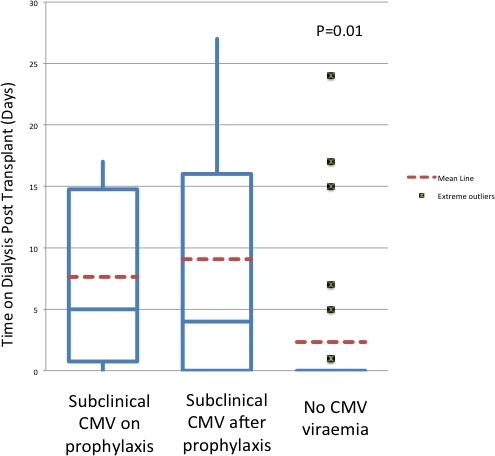Subclinical Cytomegalovirus Viraemia in Renal Transplant Recipients.
1Renal Transplant Unit, Austin Hospital, Melbourne, Victoria, Australia
2Renal Unit, Monash Medical Centre, Melbourne, Victoria, Australia.
Meeting: 2016 American Transplant Congress
Abstract number: D245
Keywords: Cytomeglovirus, Ganciclovir, Kidney transplantation, Prophylaxis
Session Information
Session Name: Poster Session D: Poster Session II: Kidney Complications-Other
Session Type: Poster Session
Date: Tuesday, June 14, 2016
Session Time: 6:00pm-7:00pm
 Presentation Time: 6:00pm-7:00pm
Presentation Time: 6:00pm-7:00pm
Location: Halls C&D
Background: Studies suggest low-level cytomegalovirus (CMV) viraemia, detected with sensitive molecular assays, may lead to poorer graft outcomes following renal transplantation.
Aims: Investigate the incidence, outcomes, and clinical associations of subclinical CMV viraemia in adult renal transplant recipients.
Methods: A retrospective cohort study from January 2010 to March 2012 with 3 years follow up.
Results: 22/59 patients were diagnosed with subclinical viraemia. 8/22 cases occurred whilst receiving anti-viral prophylaxis. Renal function was similar at 12, 24 and 36 months in both CMV viraemic and non-viraemic patients. Total rejection was not different (p=0.13) between groups. Anti-viral prophylaxis was under-dosed when corrected for GFR at day 7 in 83.3% of patients who developed viraemia on prophylaxis, compared to 23.1% of patients with viraemia after prophylaxis stopped and 22.7% of patients who were never viraemic (p=0.03). By 21 days there was no significant difference in prophylaxis dosing between groups. In those who developed CMV during prophylaxis the percentage improvement in GFR at 14 to 28 days was 161.7% compared to 49.7% in the CMV after prophylaxis and 36.3% in the never viraemic group p=0.001. Median time on dialysis post transplant was higher in those who later developed subclinical viraemia p=0.01 (Figure1)
Conclusion: Subclinical CMV viraemia is common and associated with early dialysis requirements following transplantation. Early under-dosing of antiviral prophylaxis was significantly associated with rapid improvement in GFR and a risk factor for subclinical CMV during the prophylaxis period. Accurate early prophylaxis dosing and CMV surveillance may benefit patients with delayed graft function.

CITATION INFORMATION: Barker K, Cook N, Kevan P, Frank I. Subclinical Cytomegalovirus Viraemia in Renal Transplant Recipients. Am J Transplant. 2016;16 (suppl 3).
To cite this abstract in AMA style:
Barker K, Cook N, Kevan P, Frank I. Subclinical Cytomegalovirus Viraemia in Renal Transplant Recipients. [abstract]. Am J Transplant. 2016; 16 (suppl 3). https://atcmeetingabstracts.com/abstract/subclinical-cytomegalovirus-viraemia-in-renal-transplant-recipients/. Accessed July 15, 2025.« Back to 2016 American Transplant Congress
